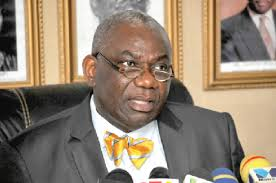Special topics
 Energy Minister, Boakye Agyarko has said the government will establish a ‘new TOR’ in Takoradi in the next three to four years to refine about 150,000 barrels of oil per day.
Energy Minister, Boakye Agyarko has said the government will establish a ‘new TOR’ in Takoradi in the next three to four years to refine about 150,000 barrels of oil per day.
The move which would be led by the private sector is part of plans to help Ghana attain energy hub status that the government is aiming at in the short to medium term.
Mr Agyarko said the issue has already been discussed with the TOR board and an implementation committee has been set up.
He said, “The idea, therefore, is to create a hub in the Western region where you have the refining, storage, transportation and trading all happening within an enclave. It will be largely export-oriented.”
“The idea subsequent to this, which has been discussed with the board of TOR is to make sure that in the next three to four years we build a new TOR of about 150,000b0pd and then gradually ease out the old TOR which will become a tank farm for the new TOR. Because you see, the old TOR currently is at 20,000bopd; not satisfactory,” Mr Agyarko said.
He was speaking to JoyBusiness at the Petroleum Downstream Colloquium held in Accra under the theme: “Ghana’s petroleum downstream – then, now and the future.”
Mr Agyarko said, “We’ve already put in place an implementation committee which is looking at all the facet and the regulations required that is in my speech I made reference to the need to make adjustments to the law.
We’ve sent out the various teams to look at all the other hubs that operate in the world. I believe that in the not too distant future – two, three years you will begin to see the actual manifestations of these developments,” he said.
Petroleum industry
The industry has witnessed significant investment and expansion of petroleum products storage and outlet facilities largely championed by the private sector which is mostly dominated by a growing number of indigenous Ghanaian companies due to the deregulation of the petroleum downstream industry.
This has translated to a significant number of new entrants licensed to operate as Petroleum Service Providers (PSPs) in the industry.
Consequently, there are currently over two hundred and fifty (250) licensed companies across the value chain players and support services in over fifteen (15) different categories in the downstream sector.
Contribution to GDP
The sector has over the years contributed significantly to the growth and development of the economy.
Over the past four years (2013-2016) alone, the sector is estimated to have contributed over GHS46billion to the country’s GDP, representing an average contribution of 10% per annum.
The growth of the downstream industry can be attributed to the continuous demand for petroleum products by the other sectors of the economy fueled by policy direction and initiatives.
BDCs and OMCs
Over the past seven years the industry has grown from a total of eight Bulk Distribution Companies (BDCs) to 40, the number of Oil Marketing Companies (OMCs) has grown from 81 to142, with 19 companies providing support services for the sector in areas such tank calibration, UST and AST tank cleaning, non-destructive testing, amongst others as at December 2017.